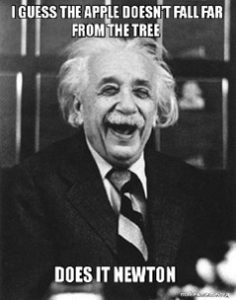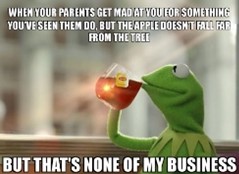Are you looking for a way to describe someone's son emulating his father's behavior and character traits? If so, you can use "the apple doesn't fall far from the tree." This post unpacks the meaning and origin of this expression.
Meaning
The phrase "the apple doesn't fall far from the tree" refers to someone's child emulating the attitude or behavior of their father. The expression may refer to the child's physical appearance, behavior, or actions.
It's a similar saying to "like father, like son," but it can apply to boys and girls. Typically, people use the expression when referring to boys and their fathers.
Example Usage
"Chris has all the behavioral characteristics of his dad. Look at how he thinks before he does anything. The apple doesn't fall far from the tree."
"Tim was arrested last night on grand theft auto charges. How ironic, his father went to jail for the same thing at his age. The apple doesn't fall far from the tree."
"It pains me to say it, but the apple doesn't fall far from the tree. Change your attitude, or you'll end up like your father."
"Hank is a top swimmer, and he's going to the D1 nationals. It's clear the apple doesn't fall far from the tree. His father was an Olympian and it looks like he’s on the same path."


Origin
The origin of the expression “the apple doesn’t fall far from the tree” often features as a synonym describing the experience of Adam and Eve in the Garden of Eden.
However, no written evidence shows a connection between the saying and this biblical story. The earliest recorded use of the proverb comes from a translation of "Rasmus Rask's Grammar of the Anglo-Saxon Tongue," written by Benjamin Thorpe and published in 1830.
"Traces still exist in the daily language of the Icelanders, for instance in the proverb, eplit fellr ekki lánt frá eikinni the apple falls not far from the tree (the oak!)."
Legendary author and poet Ralph Waldo Emerson used the English translation of a German saying with a similar meaning in 1839.
“der Apfel fällt nicht weit von Stamm,” translates to “As men say the apple never falls far from the stem.”
Soon after, George Henry Borrow wrote "The Bible in Spain" in 1843, where the proverb appears as follows.
"The apple', as the Danes say, 'had not fallen far from the tree'; the imp was in every respect the counterpart of the father."
Phrases Similar to The Apple Doesn’t Fall Far from the Tree
- Like father, like son.
- Great minds think alike.
- Two peas in a pod.
Phrases Opposite to The Apple Doesn’t Fall Far from the Tree
- He is not his father’s son.
What is the Correct Saying?
- The apple doesn’t fall far from the tree.
- The apple never falls far from the tree.
Ways People May Say The Apple Doesn’t Fall Far from the Tree Incorrectly
Typically, people will use the phrase to describe boys or young men. It’s not common for people to use the expression to describe girls or young women. Using the plural of the phrase “apples don’t fall far from the trees” would be incorrect.
Acceptable Ways to Phrase The Apple Doesn’t Fall Far from the Tree
You can use the expression, “the apple doesn’t fall far from the tree,” when describing how someone’s actions emulate their fathers.
It’s a similar saying to “like father, like son.” The phrase suits social use and doesn’t appear in professional language.
You could use it when describing your child or when referring to the traits of a child whose parents you know well.